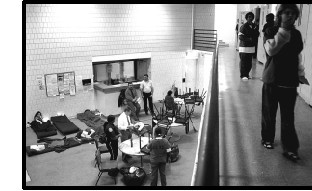|
That well-worn feminist slogan "the personal is
political" has taken on a new, exclusive meaning in the past several
years. The personal, it seems, is all that's political anymore.
Feminism--on college campuses, in the media and even in Washington--has
become overwhelmingly personal at the expense of political action.
While the economic chasm between rich and poor widens, why have
many feminist sources repeatedly trumpeted Monica and masturbation,
confessionals, Kegel exercises and Courtney Love?
The one big feminist political issue of the '90s
was abortion. Feminists have obsessed over Roe v. Wade and
championed Clinton and Gore for defending the right to choose. But
at the same time, most women in this country have watched their
ability to obtain an abortion disappear. As Miranda Kennedy points
out in "Access Denied," 85 percent of counties nationwide have no
abortion provider. It's still true that women with money can always
access abortion, but women with less cannot.
From health care to the workplace, one important
question has been lost: What about women who still lack the basic
rights middle- and upper-class women now take for granted? In this
issue, In These Times looks at a few of the problems facing
those left behind in the feminist revolution. As Barbara Ehrenreich
wrote last year in these pages, "While middle-class women gained
MBAs, working-class women won the right to not be called 'honey'--and
not a whole lot more than that."
It's time to move on to a "fourth wave" of feminism.
It's goal should be to close the class gap and extend feminism's
gains to all women. Old-time "women's lib" feminists and my generation's
riot grrrls need to get busy and get radical. Instead of sticking
up for politicians, we need to get in their faces and demand greater
economic equality and, in turn, greater freedom for all women.
Kristin Kolb-Angelbeck
Gloria Johnson knew she had multiple sclerosis when she entered
the maximum-security Central California Women's Facility in Chowchilla
to serve a 35-month sentence for embezzlement in 1995. She had been
diagnosed with the degenerative disease in 1979, and she knew what
medications and care she needed to keep her condition in check.
But in prison, not only was Johnson denied the medicine she needed,
but guards and
 |
|
JANET BLACKMON
MORGAN
|
administrators were dismissive of her requests and questioned whether
she even had MS. Lacking the necessary treatments and suffering the
same poor nutrition and hygiene conditions that affect almost all
women in prison, her condition drastically worsened. Johnson became
a quadriplegic, unable to move her arms or legs, and she needed constant
care. For the last 18 months of her sentence, she sat in her cell
wearing a diaper 24 hours a day; she was brought to the toilet only
once a day. She bathed "when they felt like it" and brushed her teeth
"when they had time."
"They won't give you the medicine or the tests you need," says
Johnson, 46, who now lives in San Diego and collects disability
payments. "They have the attitude that you're a prisoner so you
don't deserve anything. They had me on so many meds I was nodding
off all the time, but they wouldn't give me betaseron." After her
release, Johnson resumed her treatment. "Within nine months I was
getting better," she says. "I could move my arms again. It was the
prison that caused me to become a quadriplegic."
Cynthia Martin had a similar experience at Central California Women's
Facility. She was convicted of arson after being caught in a fire
in a house her boyfriend was rehabbing. Martin entered prison with
second- and third-degree burns covering 54 percent of her body.
Prison medics and guards denied Martin lotion for her burns. Her
body was covered with pressure garments she needed to wear 23 hours
a day, and she wasn't given new ones during the three years she
was in prison."Imagine the worst sunburn you could think of, multiply
that by 10, and think of not being able to put lotion on," says
Martin, 52. "When I finally would get some lotion, it would run
out in a few days, and I'd have to fight for months to get more.
I even had my family sending me lotion and oils, and they would
return the packages without letting me get them."
As bad as her care was, Martin says she witnessed even worse. "I
saw guards kicking people having seizures, or standing by and letting
them writhe on the ground, breaking their teeth," she says. "When
other inmates tried to help, they would push them away. I saw a
girl go to the doctor with heart problems, and he told her to take
Motrin and go to bed. By morning she had died of a heart attack."
The abysmal care received by Johnson and Martin is typical. While
many doctors and health advocates say the health care prisoners
receive is substandard, incarcerated women face far worse situations
than men. "Historically women in the United States have been treated
as second-class citizens to men, and prison is no different," says
Barbara Echols, executive director of the Chicago-based Prison Action
Committee, which recently released a three-year study detailing
the failings of health care in Illinois prisons. "Research has indicated
that imprisoned males receive woefully inadequate and substandard
medical care. The health care received by female prisoners is even
worse, despite the fact that women have more numerous and more unique
health care needs."

|




